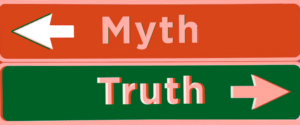When you check around, various industry observers find way too many sales myths that need to be shattered. Which myths do you find that you tend to believe?
• Salespeople should always call high.
o Truth is calling lower than the top can be the better route to success. It depends on what problem your product or service addresses.
• Closing is most important and should be done at any cost and sooner than later. You should always be striving to close early and as often as you can.
o Truth is most successful sales close themselves when you address all the concerns you need to, and you make it clear what outcome your customer will receive.
• Enthusiasm in your presentations is always key to success.
o Truth is your passion and commitment to solving your customer’s problem is more important. Focus on finding out what they need and want and how you can help them.
• The better salesperson always is the extroverted one.
o Truth is introverts often can listen better, be more understanding and more focused on the customer.
• The gift of gab is all you need to succeed in sales.
o Truth is the customer is the one who should doing most of the talking, not the salesperson who should be focused on questions that help him or her find the customer’s or prospect’s real needs.
• Price is always the most important factor to buyers.
o Truth is price usually is only one of several factors the buyer makes, and the ‘cheapest’ is not likely the one they want. Customer value is key.
• Quotas are always most important.
o Truth is while quotas are useful, it only tells you how much the sales should be and not how much they ‘could’ be. Instead, figure out how to improve your sales processes to improve sales productivity and how to increase sales effectiveness to sell more of what could be sold. Free up time up for selling more effectively to more of the right customers and prospects.
• Referrals will automatically come when you do a good job.
o Truth is most salesperson cannot count on referrals coming to them, that they’ll be few and far between instead of in a steady flow. It takes work. You have to ask for them, and you have to help your customer have a good idea of who is a good referral for you.
• Rejection is an essential part of all sales, and having a thick skin is needed for success; you must be good at handling rejection.
o Truth is you get rejection when you are trying to sell to the wrong market or prospect. Reduce the amount you get by avoiding prospects who don’t need what you are offering.
• Sales is a numbers game. Success in sales comes from playing the odds; it requires you to contact a large number of prospective customers before you can get a sale, and this means the more calls you make, the more visits you make, the more emails you send, the more faxes you broadcast, the more sales you will have.
o Truth is you increase your odds of a sale the more you focus on connecting with the right people with the right messaging. It’s not just about simply doing lots of activity with non-tailored messaging. Be smarter about how and where you put your efforts.
• Selling is a one-person job.
o Truth is many people contribute to the sale.
• Small talk and warm-up conversation must always happen.
o Truth is it depends on the personality of your customer or prospect.
• Anyone can sell.
o Truth is those who succeed at selling have a desire to create relationships, are willing to do the research they need, and to can clearly inform the customer or prospect of the outcomes. You need to be patient and to persist. Typically, this is part of the person’s personality.
• Success requires prior industry experience.
o Truth is it takes some time to learn an industry, but a fresh take on current industry conditions, a customer-centric approach and asking the right questions are more important than merely having industry experience.
• Success requires prior sales experience.
o Truth is people who like to work hard, are patient, can persist, can do research that’s needed, and are customer-focused can be taught to sell.
• You can’t sell complex or enterprise-wide products, services or solutions over the phone.
o Truth is with today’s communications technologies and executives’ busy schedules, the phone plays an important part in the mix with in-person selling. Either way, you still need to ask the right questions to understand their situation and how you can help.
These are just some key myths of the many more that exist.

